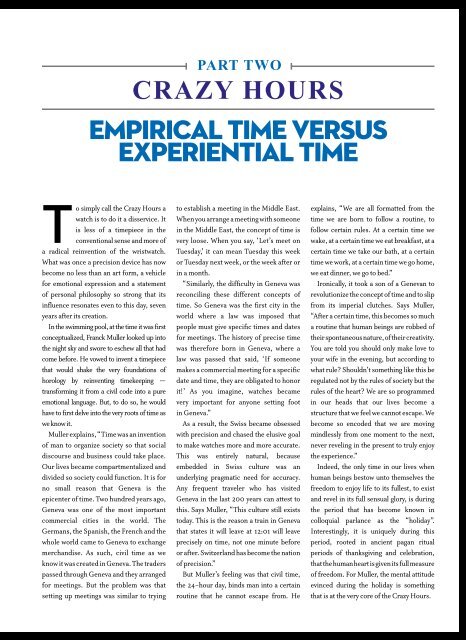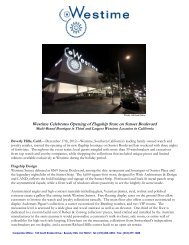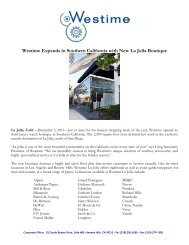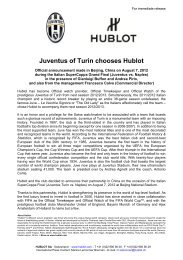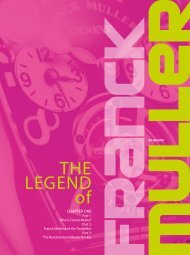The Legend of Franck Muller - Westime
The Legend of Franck Muller - Westime
The Legend of Franck Muller - Westime
You also want an ePaper? Increase the reach of your titles
YUMPU automatically turns print PDFs into web optimized ePapers that Google loves.
PART TWO<br />
CRAZY HOURS<br />
EMPIRICAL TIME VERSUS<br />
EXPERIENTiAL TIME<br />
To simply call the Crazy Hours a<br />
watch is to do it a disservice. It<br />
is less <strong>of</strong> a timepiece in the<br />
conventional sense and more <strong>of</strong><br />
a radical reinvention <strong>of</strong> the wristwatch.<br />
What was once a precision device has now<br />
become no less than an art form, a vehicle<br />
for emotional expression and a statement<br />
<strong>of</strong> personal philosophy so strong that its<br />
influence resonates even to this day, seven<br />
years after its creation.<br />
In the swimming pool, at the time it was first<br />
conceptualized, <strong>Franck</strong> <strong>Muller</strong> looked up into<br />
the night sky and swore to eschew all that had<br />
come before. He vowed to invent a timepiece<br />
that would shake the very foundations <strong>of</strong><br />
horology by reinventing timekeeping —<br />
transforming it from a civil code into a pure<br />
emotional language. But, to do so, he would<br />
have to first delve into the very roots <strong>of</strong> time as<br />
we know it.<br />
<strong>Muller</strong> explains, “Time was an invention<br />
<strong>of</strong> man to organize society so that social<br />
discourse and business could take place.<br />
Our lives became compartmentalized and<br />
divided so society could function. It is for<br />
no small reason that Geneva is the<br />
epicenter <strong>of</strong> time. Two hundred years ago,<br />
Geneva was one <strong>of</strong> the most important<br />
commercial cities in the world. <strong>The</strong><br />
Germans, the Spanish, the French and the<br />
whole world came to Geneva to exchange<br />
merchandise. As such, civil time as we<br />
know it was created in Geneva. <strong>The</strong> traders<br />
passed through Geneva and they arranged<br />
for meetings. But the problem was that<br />
setting up meetings was similar to trying<br />
to establish a meeting in the Middle East.<br />
When you arrange a meeting with someone<br />
in the Middle East, the concept <strong>of</strong> time is<br />
very loose. When you say, ‘Let’s meet on<br />
Tuesday,’ it can mean Tuesday this week<br />
or Tuesday next week, or the week after or<br />
in a month.<br />
“Similarly, the difficulty in Geneva was<br />
reconciling these different concepts <strong>of</strong><br />
time. So Geneva was the first city in the<br />
world where a law was imposed that<br />
people must give specific times and dates<br />
for meetings. <strong>The</strong> history <strong>of</strong> precise time<br />
was therefore born in Geneva, where a<br />
law was passed that said, ‘If someone<br />
makes a commercial meeting for a specific<br />
date and time, they are obligated to honor<br />
it!’ As you imagine, watches became<br />
very important for anyone setting foot<br />
in Geneva.”<br />
As a result, the Swiss became obsessed<br />
with precision and chased the elusive goal<br />
to make watches more and more accurate.<br />
This was entirely natural, because<br />
embedded in Swiss culture was an<br />
underlying pragmatic need for accuracy.<br />
Any frequent traveler who has visited<br />
Geneva in the last 200 years can attest to<br />
this. Says <strong>Muller</strong>, “This culture still exists<br />
today. This is the reason a train in Geneva<br />
that states it will leave at 12:01 will leave<br />
precisely on time, not one minute before<br />
or after. Switzerland has become the nation<br />
<strong>of</strong> precision.”<br />
But <strong>Muller</strong>’s feeling was that civil time,<br />
the 24-hour day, binds man into a certain<br />
routine that he cannot escape from. He<br />
explains, “We are all formatted from the<br />
time we are born to follow a routine, to<br />
follow certain rules. At a certain time we<br />
wake, at a certain time we eat breakfast, at a<br />
certain time we take our bath, at a certain<br />
time we work, at a certain time we go home,<br />
we eat dinner, we go to bed.”<br />
Ironically, it took a son <strong>of</strong> a Genevan to<br />
revolutionize the concept <strong>of</strong> time and to slip<br />
from its imperial clutches. Says <strong>Muller</strong>,<br />
“After a certain time, this becomes so much<br />
a routine that human beings are robbed <strong>of</strong><br />
their spontaneous nature, <strong>of</strong> their creativity.<br />
You are told you should only make love to<br />
your wife in the evening, but according to<br />
what rule? Shouldn’t something like this be<br />
regulated not by the rules <strong>of</strong> society but the<br />
rules <strong>of</strong> the heart? We are so programmed<br />
in our heads that our lives become a<br />
structure that we feel we cannot escape. We<br />
become so encoded that we are moving<br />
mindlessly from one moment to the next,<br />
never reveling in the present to truly enjoy<br />
the experience.”<br />
Indeed, the only time in our lives when<br />
human beings bestow unto themselves the<br />
freedom to enjoy life to its fullest, to exist<br />
and revel in its full sensual glory, is during<br />
the period that has become known in<br />
colloquial parlance as the “holiday”.<br />
Interestingly, it is uniquely during this<br />
period, rooted in ancient pagan ritual<br />
periods <strong>of</strong> thanksgiving and celebration,<br />
that the human heart is given its full measure<br />
<strong>of</strong> freedom. For <strong>Muller</strong>, the mental attitude<br />
evinced during the holiday is something<br />
that is at the very core <strong>of</strong> the Crazy Hours.


